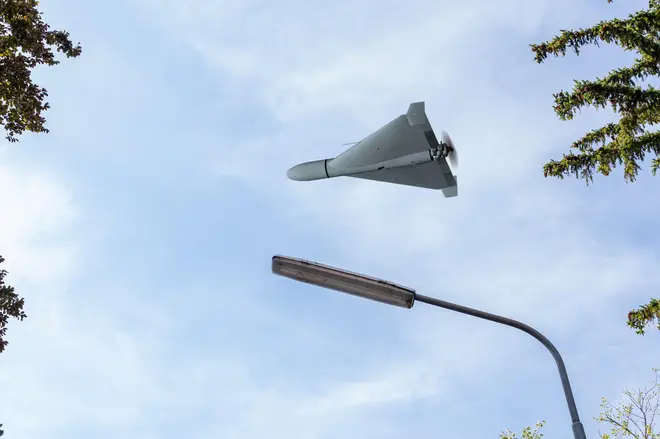
Matthew Wright 7am - 10am
14 April 2024, 22:38 | Updated: 15 April 2024, 13:20
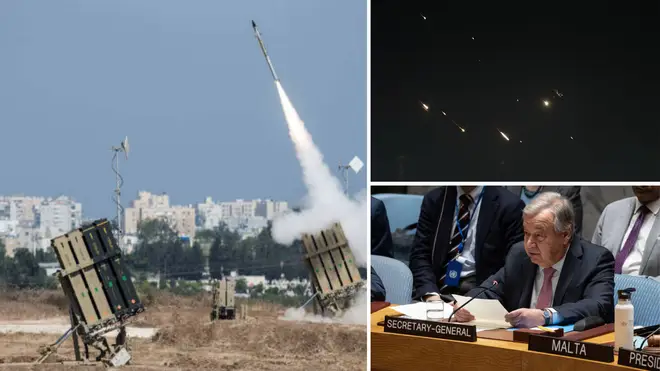
The UN has warned that "the Middle East is on the brink", as the Israeli government backed a plan to strike back after Iran launched hundreds of missiles into its territory.
Antonio Guterres, the UN's secretary-general said that people in the region "are confronting a real danger of a devastating, full-scale conflict.
"Now is the time to defuse and de-escalate. Now is the time for maximum restraint."
He added: "It's time to step back from the brink. It's vital to avoid any action that could lead to major military confrontations on multiple fronts in the Middle East.
"Civilians are already bearing the brunt and paying the highest price."
His comments came after Israel said it had approved a plan to strike back at Iran, although it did not provide details on when this would take place.
And Israel also told the UN Security Council that it had the right to retaliate against Iran, comparing the Tehran regime to Nazi Germany.
Iran has said that it would strike back if Israel retaliated to its initial attack on Saturday night, which comprised 300 missiles and drones. The US, UK, France and Jordan were among the countries who helped Israel shoot down the majority of the projectiles.
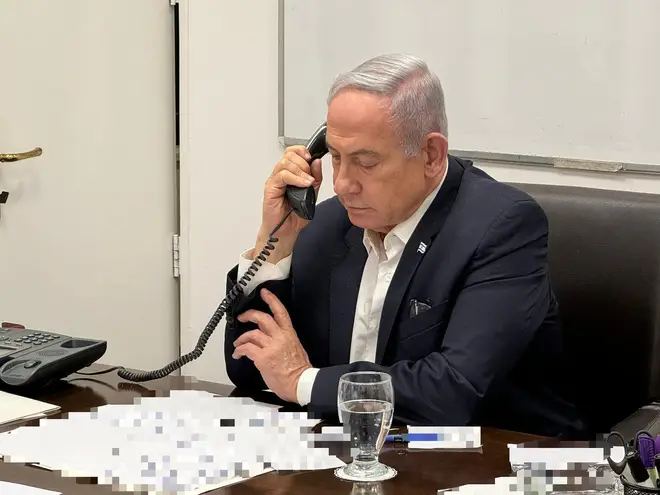
A girl was critically injured by one missile, while a military base also suffered some damage when it was struck.
The G7 group of powerful countries, which includes the US and UK, said it backed Israel but pressed for stability in the Middle East.
Joe Biden has also urged restraint from Israel, warning Benjamin Netanyahu that the US would not take part in a counter-offensive. “You got a win - Take the win," the US president is said to have told the Israeli prime minister after the largely successful defence.
Speaking after a meeting of Israel's war cabinet on Sunday evening, military spokesman Rear Admiral Daniel Hagari, said the IDF was "on high alert" and is still "assessing the situation".
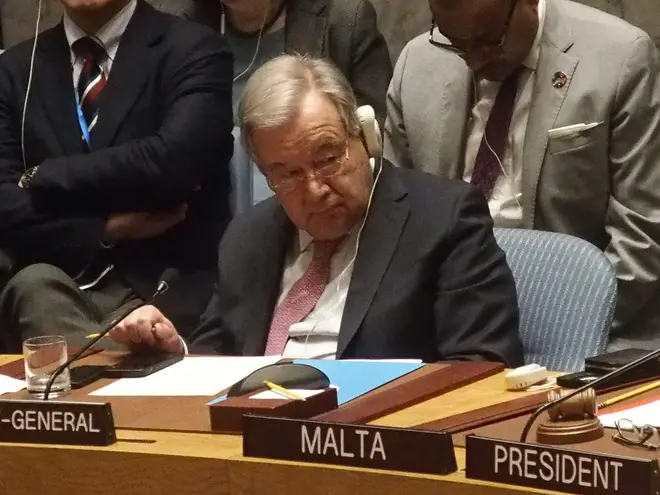
He said of the meeting: "Over the last two hours, we approved operational plans for both offensive and defensive action.
Read more: RAF jets shot down ‘a number’ of Iranian drones attacking Israel, Rishi Sunak says
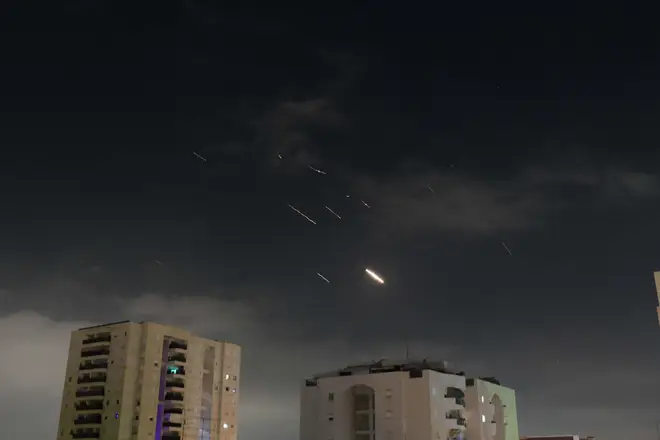
"We will continue to protect the State of Israel, and together with our partners, we will continue to build a more secure and stable future for the entire Middle East."
He did not give a timescale for the offensive plans, or any more details.
It came after a war cabinet minister said ahead of the meeting that Israel would "collect a price" for Iran's strike, which came in response to what Iran claimed was a deadly attack on its embassy in Syria.
Benny Gantz said: "Yesterday, Iran launched an attack on Israel - and met the strength of the Israeli security system."
He added: "This event is not over - the strategic alliance and the regional cooperation system that we built and stood its significant test need to be strengthened precisely now."
Mr Gantz said: "Faced with the threat of Iran - we will build a regional coalition and collect the price from Iran, in the way and at the time that suits us."
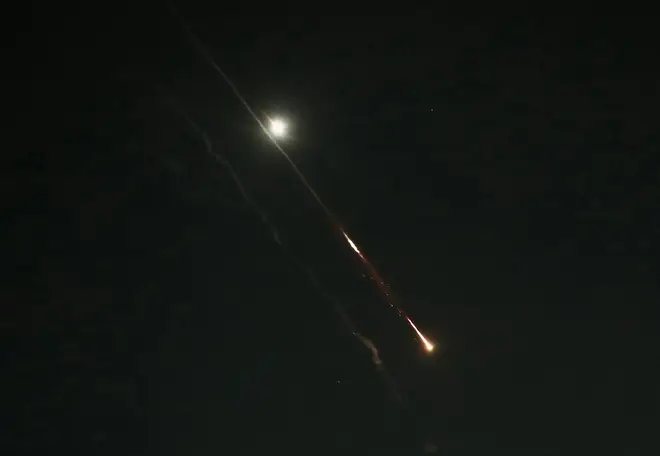
Joe Biden has reaffirmed the US' "ironclad" support for the defence of Israel, but a national security spokesperson has said it would not take part in any attack on Iran.
"We don't seek escalated tensions in the region. We don't seek a wider conflict," John Kirby said.
The G7 - made up of the US, the UK, Germany, France, Canada, Italy, Japan and the EU - expressed their "full solidarity and support to Israel".
They said in a statement: "We, the Leaders of the G7, unequivocally condemn in the strongest terms Iran’s direct and unprecedented attack against Israel. Iran fired hundreds of drones and missiles towards Israel. Israel, with the help of its partners, defeated the attack.
"We express our full solidarity and support to Israel and its people and reaffirm our commitment towards its security.
"With its actions, Iran has further stepped toward the destabilization of the region and risks provoking an uncontrollable regional escalation. This must be avoided.
"We will continue to work to stabilize the situation and avoid further escalation. In this spirit, we demand that Iran and its proxies cease their attacks, and we stand ready to take further measures now and in response to further destabilizing initiatives.
"We will also strengthen our cooperation to end the crisis in Gaza, including by continuing to work towards an immediate and sustainable ceasefire and the release of hostages by Hamas, and deliver increased humanitarian assistance to Palestinians in need."
The UK has backed Israel, with RAF planes participating in the efforts to shoot down Iranian missiles and drones, Rishi Sunak said on Sunday.
And Foreign Secretary David Cameron summoned a senior Iranian diplomat in London to the Foreign Office.
He also said that he "formally condemned in the strongest terms Iran's attack on Israel in a call with Iranian Foreign Minister Amir-Abdollahian."
Lord Cameron said he "made clear that Iran must stop these reckless attacks, de-escalate and release the MSC Aries [an Israel-affilated ship Iran has seized]."

Former UK Ambassador there needs to be a 'process that enables the Iran conflict to come to an end'
Meanwhile Sir Mark Lyall-Grant, a former ambassador to the UN, told LBC's Carol Vorderman that the UK participating was unsurprising because "the British government has always been an ally of Israel.
"So it's not surprising that Britain is standing beside Israel after it was attacked by... the atrocities of the terrorist attack by Hamas on October".
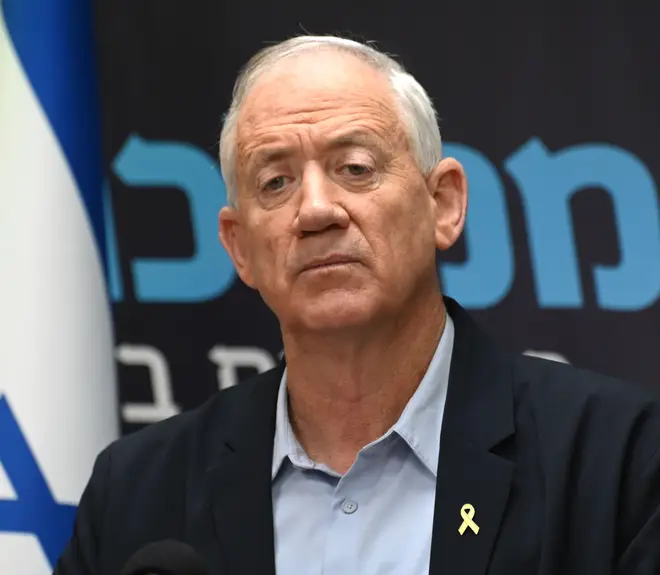
Saturday night's attack unfolded as air raid sirens sounded across Israel to warn civilians of the threat from above after the Israel Defense Force (IDF) warned of the incoming assault at 11pm local time (9pm BST).
In an update on Sunday morning, Israeli military spokesman Mr Hagari said that more than 300 weapons had been fired by Iran, 99% of which were intercepted.
He said few of the missiles reached Israel, after Iran fired 170 drones, more than 30 cruise missiles and more than 120 ballistic missiles.
He described the country’s interception mission as “a very significant strategic success” but said the situation is still unfolding and aircraft continue to patrol the skies.
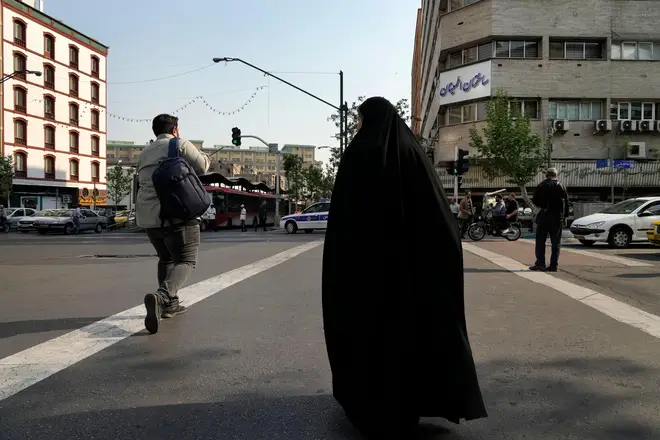
“Iran pushed the Middle East towards escalation. We will do whatever is necessary,” he added.
Additional RAF jets have been moved to the region to bolster Operation Shader, the UK’s counter-Daesh operation in Iraq and Syria, the Ministry of Defence (MoD) said in a statement on Sunday morning.
The MoD said it will continue to intercept any airborne attacks within its range of existing missions.

Alastair Burt,
Read more: Israel fights off massive Iran attack - downing over 200 missiles and drones with help of RAF
In an update posted to X on Sunday morning, Israeli Prime Minister Benjamin Netanyahu said: “We intercepted. We blocked. Together we will win.”
Israel's Defence Minister Yoav Gallant also said he has carried out an operational situation assessment with officials in Israel’s defence establishment as he warned the situation is "not yet over".
He said: “Together with the United States and additional partners, we managed to defend the territory of the State of Israel. Very little damage was caused – this is the result of the IDF’s impressive operations.
“The campaign is not yet over - we must remain alert and attentive to the instructions published by the IDF and Homefront Command. We must be prepared for every scenario. Having said this, we have thwarted the most significant wave [of the attack], and we did so successfully.”
Speaking to LBC’s Matthew Wright, former foreign office minister Alistair Burt said the UK is "doing everything it can" to reduce tensions in the region.
He said: “The issue is where this goes from here.
“There is still an opportunity, as many countries are saying in their statements, to reduce this tension by saying to both states we can’t really go on like this, sooner or later, tit for tat goes wrong and then you have a real disaster in the region.”
He continued: “The UK is doing everything it can to warn of an increased risk of escalation, but the United Kingdom's support for the existence of the state of Israel is pretty well unquestioned throughout the UK and the political system, as is the case with the United States.
“By having military activity in the area to defend Israel, making a point to Iran about its activities, but it’s not designed to be aggressive or offensive, it’s designed to say to Iran there are consequences to actions - do not go any further. But I would imagine the private messaging to Israel will also be today: your response to this must be extremely careful, if not to escalate the situation still further.”
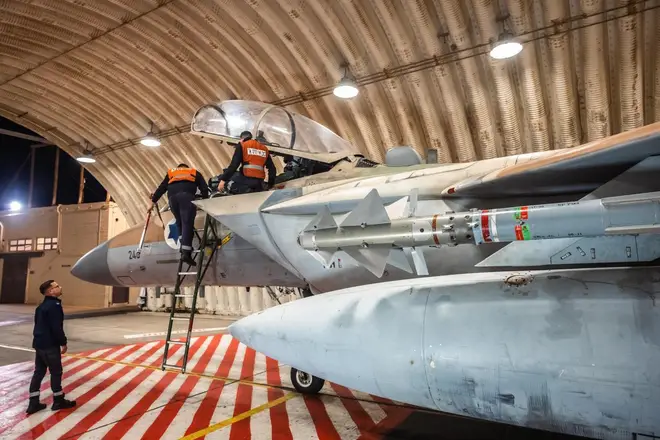
Israel's sophisticated Iron Dome and other defences were seen intercepting drones and missiles - including parts of the disputed West Bank region.
Rockets fired by Hezbollah militants in Lebanon were also fired into northern Israel during the attack.
An IDF spokesperson earlier confirmed that Israelis are no longer required to stay near bomb shelters - as the military gives the all-clear to civilians.
The Israeli army had ordered residents of the Golan Heights in the north and Nevatim, Dimona and Eilat in the south to stay close to a protected space - such as a shelter, stairwell or inner room - until further notice.
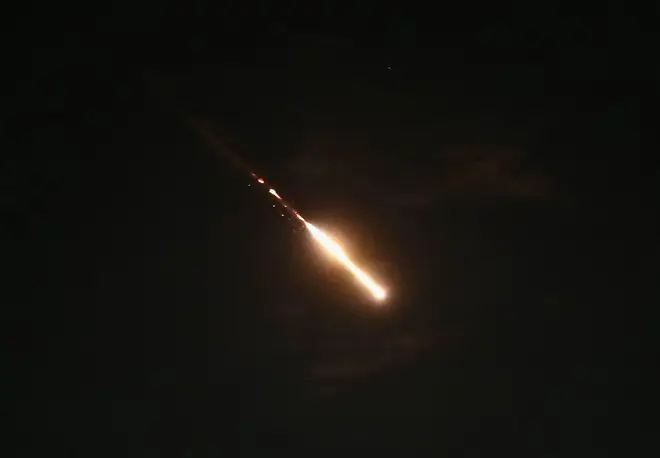
The IDF confirmed that a "small number" of hits were recorded in Israel - including a military base in the south which suffered minor infrastructure damage.
No casualties have been recorded - as most of the weapons were intercepted by Israeli air defences - alongside their air force, and jets from the Royal Air Force (RAF) and US military.
Israel has called for an emergency meeting of the United Nations Security Council to hold a vote on condemning the unprecedented attack.
An Israeli official vowed a "significant response" to the direct attack by Iran, Reuters news agency reported.
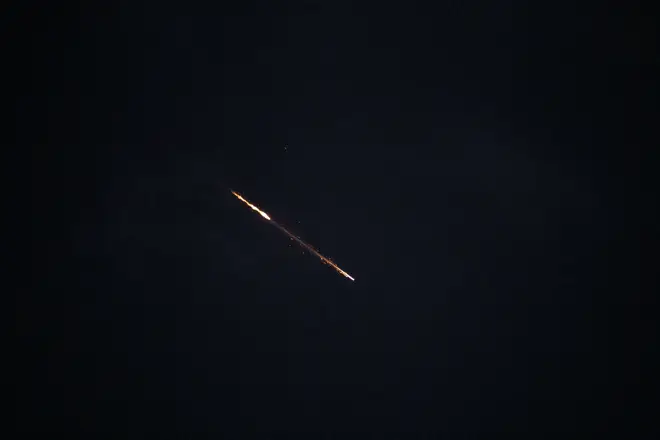
The attack was warned of in recent days since the IDF killed two Iranian generals in an air strike on the regime's consulate in Damascus, Syria on April 1.
The attack was first confirmed on Saturday evening by the IDF - saying that the Shahed drones were expected above Israel "within hours".
The drone attack is the first time Iran had ever launched a full-scale military assault on Israel, despite decades of enmity dating back to the country's 1979 Islamic Revolution.
More than 200 killer drones and cruise missiles began entering Israel around 2am local time (midnight BST).
After the confirmation of the incoming attack, Israeli, British and American forces have worked to down the weapons in Jordanian and Syrian airspace.
Reuters news agency also reported a "first wave of ballistic missiles" have also been launched - citing Iranian state news.
Israeli Prime Minister Benjamin Netanyahu chaired a meeting of the war council at the headquarters of the IDF in Tel Aviv.
Iranian media also confirmed at 10pm BST that they have launched "drones and missiles" towards "specific targets" in Israel.
Iran's ally Hezbollah then began firing rockets into northern Israel during the Iranian onslaught - as it has done frequently since the war in Gaza began in October 2023.
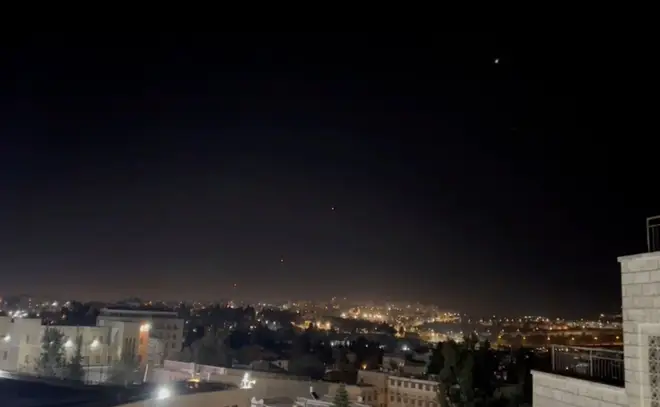
The hostile state's Revolutionary Guard said that the attack dubbed "Operation True Promise" is a "punishment for Israeli crimes".
In a televised address Israeli PM Benjamin Netanyahu said Israel was prepared for a "direct attack from Iran" following its threats of retaliation for a deadly air strike on its Damascus consulate on April 1.
He said: "We are ready for any scenario, both defensively and offensively. The State of Israel is strong. The IDF is strong. The public is strong.
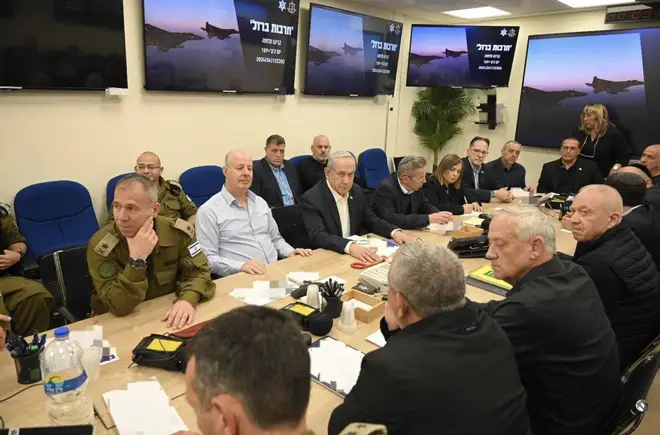
"We appreciate the US standing alongside Israel, as well as the support of Britain, France and many other countries."
The strong warning came after Iran seized a container ship linked to Israel in the Gulf, and as Israel announced it was closing schools nationwide for security reasons.
The Iranian Mission to the United Nations said on X: "Conducted on the strength of Article 51 of the UN Charter pertaining to legitimate defense, Iran’s military action was in response to the Zionist regime’s aggression against our diplomatic premises in Damascus.
"The matter can be deemed concluded. However, should the Israeli regime make another mistake, Iran’s response will be considerably more severe.
"It is a conflict between Iran and the rogue Israeli regime, from which the U.S. MUST STAY AWAY!"
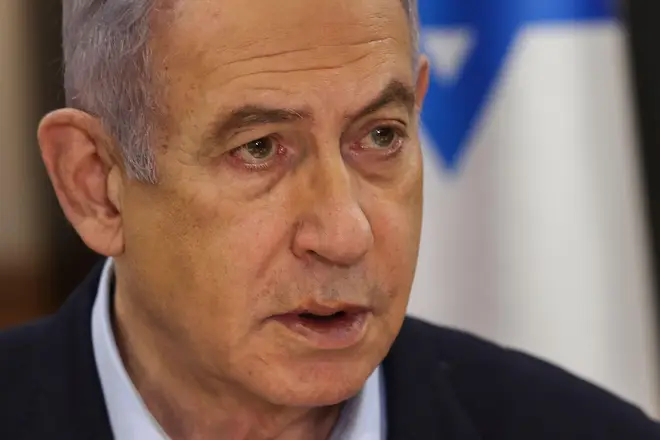
Israeli aviation authorities said they were closing the country's airspace to all flights as of 12.30am local time (10.30pm BST).
The attack was the latest escalation in tensions in the Middle East since the October 7 Hamas attacks on Israel - and will heighten fears of a full-scale regional conflict breaking out.
The Iranian attack has been widely condemned by allies of Israel and other world leaders.
I just met with my national security team for an update on Iran’s attacks against Israel. Our commitment to Israel’s security against threats from Iran and its proxies is ironclad. pic.twitter.com/kbywnsvmAx
— President Biden (@POTUS) April 13, 2024
Mr Sunak said: “I condemn in the strongest terms the Iranian regime’s reckless attack against Israel.
"These strikes risk inflaming tensions and destabilising the region. Iran has once again demonstrated that it is intent on sowing chaos in its own backyard."
“The UK will continue to stand up for Israel’s security and that of all our regional partners, including Jordan and Iraq. Alongside our allies, we are urgently working to stabilise the situation and prevent further escalation. No one wants to see more bloodshed.”
Lord Cameron added: "Iran's reckless attacks on Israel will only further inflame tensions in the Middle East.
"The UK calls on the Iranian regime to stop this serious escalation, which is in no one’s interest."
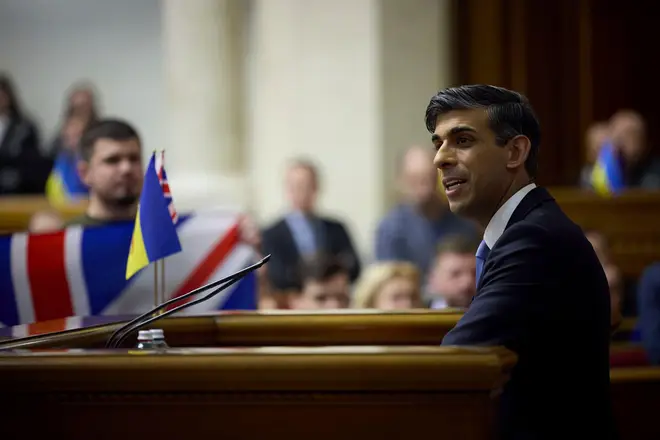
I strongly condemn the serious escalation represented by the large-scale attack launched on Israel by Iran.
— António Guterres (@antonioguterres) April 14, 2024
I call for an immediate cessation of these hostilities.
Neither the region nor the world can afford another war. https://t.co/Kmbt3zWMw7
Labour leader Sir Keir Starmer said: “We condemn the Iranian regime’s decision to subject Israelis to these unacceptable attacks.
“The international community has been united in urging restraint and we regret that yet again Iran has chosen a different, dangerous path.
“Our thoughts are with all those in the region who want peace and security not the fear and instability being generated by Iran.
“We continue to stand up for Israel’s security and that of our other partners in the region, including Jordan and Iraq. We support all measures designed to restore calm as we must do all we can to prevent a wider regional war.”
Iran launched UAVs from within its territory toward Israel a short while ago.
— Israel Defense Forces (@IDF) April 13, 2024
The IDF is on high alert and is constantly monitoring the operational situation. The IDF Aerial Defense Array is on high alert, along with IAF fighter jets and Israeli Navy vessels that are on a… pic.twitter.com/eEySouGVcN
UN Secretary-General Antonio Guterres tweeted: "I strongly condemn the serious escalation represented by the large-scale attack launched on Israel by Iran.
"I call for an immediate cessation of these hostilities.
"Neither the region nor the world can afford another war."
Iran has begun an airborne attack against Israel. President Biden is being regularly updated on the situation by his national security team and will meet with them this afternoon at the White House.
— Adrienne Watson (@NSC_Spox) April 13, 2024
